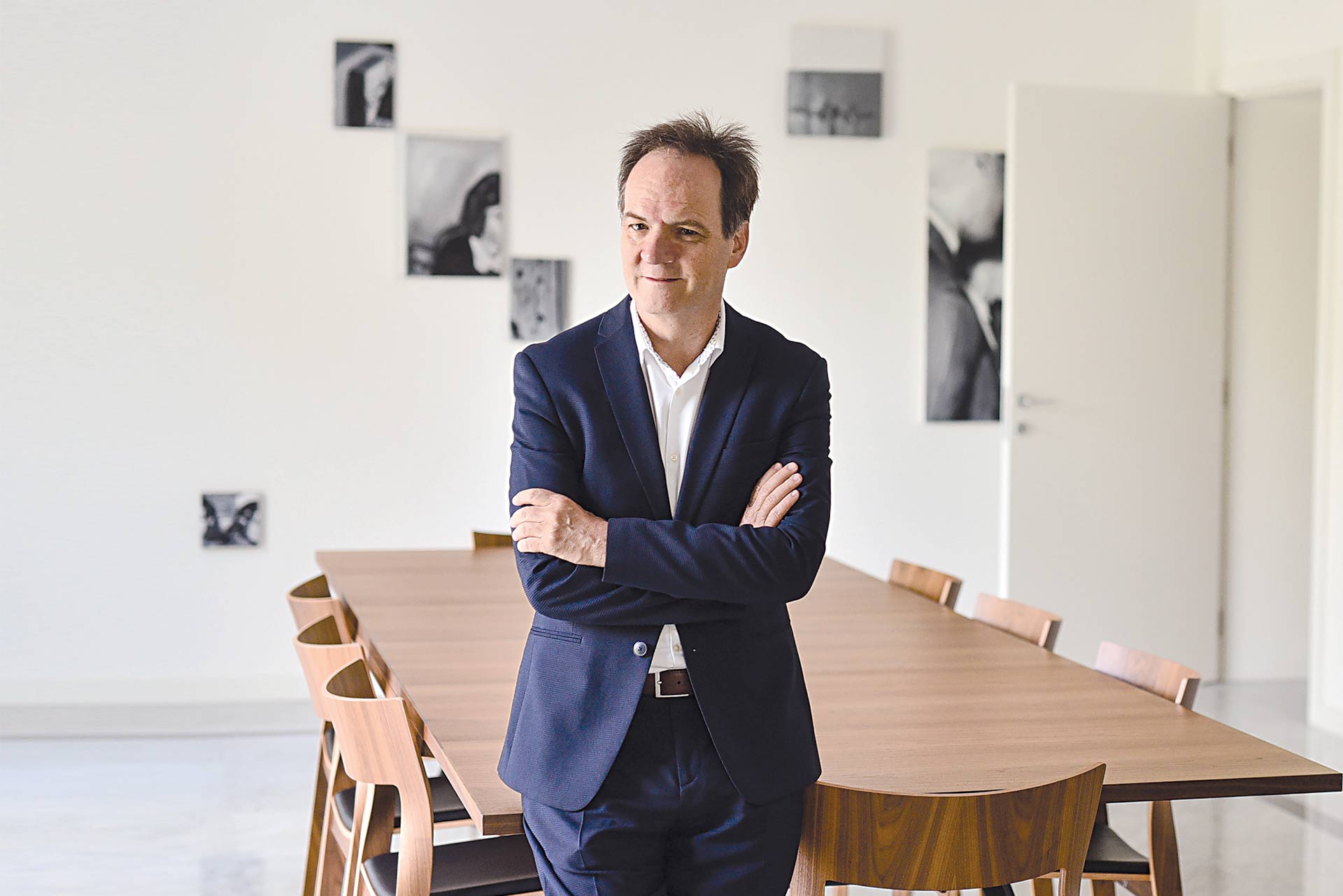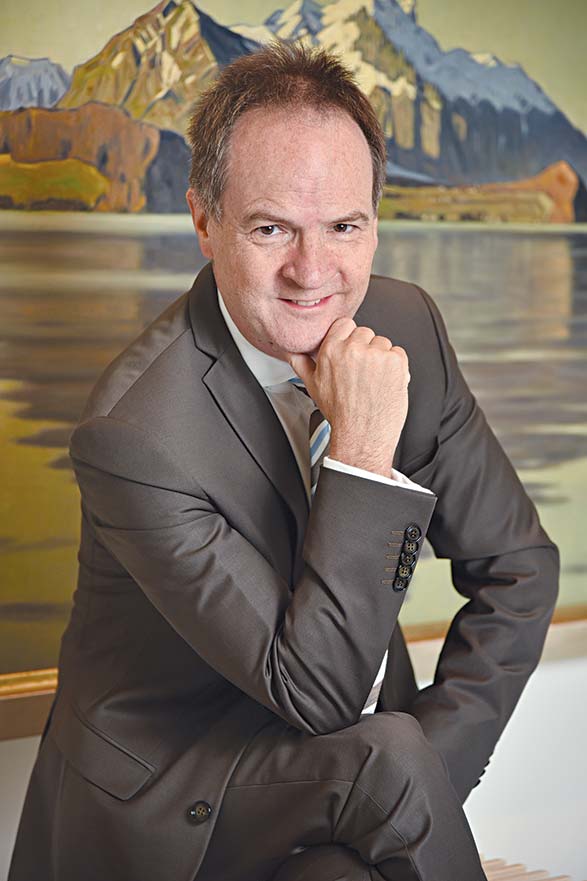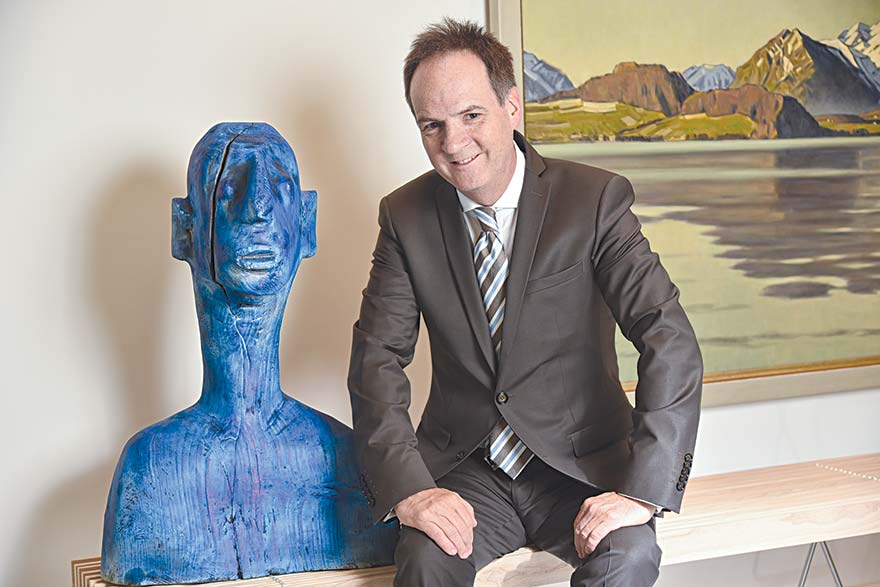There are still many reforms to be carried out to strengthen democratic institutions and processes. The recent elections have given a good example. No one has failed to see that the freedom of media is imperfectly fulfilled, as the ruling party could rely on disproportionate coverage from most major media – Philippe Guex
As he makes preparations to depart from Serbia, Swiss Ambassador Philippe Guex says that he is satisfied with the fact that, during his term, Switzerland became the third-largest donor in Serbia, and that bilateral cooperation programmes were aimed significantly towards young people, primarily through the encouragement of the introduction of dual education in schools. Ambassador Guex concludes his term by stating that Switzerland and Serbia “agree to disagree in their view of the status of Kosovo”, which he says is linked to the only unpleasantness he experienced in Serbia. He found fault with one minister for making “malicious comments” against Swiss football players originating in Kosovo. There was no such discomfort when it comes to economic cooperation. Swiss investors are generally satisfied with conditions in Serbia, but also cite shortcomings: lack of the rule of law, including within courts of justice, cases of corruption or lack of transparency of the tax administration.
Your Excellency, given that you’re approaching the end of your term in Serbia, how would you summarise the time you’ve spent in Belgrade?
I dedicated over 20 years of my career to Swiss-EU affairs in Brussels, Luxembourg, London and Paris. My appointment in Belgrade was certainly the most challenging and fascinating one, considering the wide scope of diplomatic and political issues an ambassador has to deal with.
I am particularly satisfied that during my time in Belgrade the Swiss government has increased its support to Serbia up to 24 million euros annually. Switzerland now belongs among the top three bilateral donors to Serbia. As a reminder, we are the only donor that has been present continuously, without interruption, since 1991. A highlight of the last four years is that our cooperation programmes have focused increasingly on the youth, with our dual education programmes, as well as on young entrepreneurs. After supporting the opening of Science & Technology Park Belgrade a few years ago, we are now doing the same in Niš and Čačak. Such support provides opportunities for young IT experts to develop their innovative projects into start-ups, and doing so prevents them from leaving the country.
At the start of your residency in Serbia, you noted the people’s “chaleur humaine” and the large servings of food. What else made an impression on you?
What I said in a previous interview is that the generous servings of delicious food is a feature that illustrates the great sense of hospitality of the people in Serbia, their human touch or their “chaleur humaine”, as we say in French. The creative art scene and tourism potential of the country also impressed me when I first arrived. No wonder that Serbia was the cradle of numerous talented artists, the most famous living example of which is Marina Abramović. During the first year, I spent all my holidays touring the country and I got only a glimpse of its tourism potential.
Generous servings of delicious food is a feature that illustrates the great sense of hospitality of the people in Serbia, their human touch or their “chaleur humaine”, as we say in French
Just a few examples of my fond memories: the Deliblaska Pescara sands, the splendid Studenica and Sopocani monasteries, the quiet Roman site of Romuliana, the mysterious fortress of Maglic, the astonishing synagogue in Subotica, the snowy peaks of Kopaonik, the amazing prehistoric site of Vinca, the magnificent Fruska Gora and Tara national parks, the meanders of the river Uvac. I could go on and on like that with dozens of other examples.
Your final year in Serbia has been marked by the Coronavirus pandemic. To what extent did that impact on the plans you had until the end of your term?
From one day to another, providing assistance to Swiss citizens has become a priority for me and the staff at the Embassy. We have been in constant contact with the Swiss community and have tried to respond to each request. The Serbian Ministry of Foreign Affairs was very helpful in this regard. We had good cooperation in organising repatriation flights for stranded Swiss citizens in Serbia, as well as for Serbian citizens stranded in Switzerland.

Another challenge was to respond swiftly to the Serbian authorities’ inquiry for support to manage the pandemic. Within a few days, we were able to make available 600,000 euros to help those most in need, including the elderly and men and women who lost their incomes. This amount was channelled through our local partners, including the Red Cross of Serbia.
Even prior to the Coronavirus outbreak, economic cooperation between the two countries seemed to be experiencing a slight slowdown. Do you have a suggestion about what needs to happen in Serbia in order to make the country more interesting for investors from Switzerland?
First I would like to state that most of the Swiss companies are, roughly speaking, satisfied with the business conditions that prevail in Serbia. The Swiss-Serbian Chamber of Commerce carries out an annual survey among its members that confirms this fact. This is particularly true for the big “names”, like Nestlé, Novartis, Roche, Ringier Group, SGS or Sika. The complaints I am informed about come usually from small and medium-sized enterprises (SMEs). They relate to the lack of the rule of law, including within courts of justice, cases of corruption or lack of transparency of the tax
Within a few days, we were able to make available 600,000 euros to help those most in need, including the elderly and men and women who lost their incomes
You’ve advocated strongly for Serbia’s membership in the EU, emphasising that some Swiss donations were also awarded the intention of strengthening the country’s capacity to navigate negotiations successfully and achieve EU accession. You’ve stated that these donations are about supporting the system of European values. Do you think that they can only develop within the EU; and if so, how should we interpret the fact that the Swiss have no intention of even considering membership?
We tend to forget that the European Union is first and foremost a matter of values, which are identified as the rule of law, freedom of media, a market economy, judicial independence or intolerance of corruption. Each value is important and forms part of the whole. There is no cherry-picking. Switzerland shares all these values deeply, even though our direct democracy system, as well as our specific history, prevents us from joining the EU. Serbia has decided to join the EU. That means that these values have to be shared and implemented. Switzerland, therefore, supports Serbia in achieving this goal, with the resources available as a non-EU bilateral donor.
As EU progress reports show, Serbia is moving forward, particularly in economic sectors, but there are still many reforms to be carried out in order to strengthen democratic institutions and processes. The recent elections have provided a good example. No one has failed to see that freedom of media is imperfectly fulfilled, as the ruling party could rely on disproportionate coverage from most major media outlets, including the TV channels with a national frequency.
As you prepare to depart the Western Balkans, do you see it as a future EU region or as an isolated island within the EU?
Europe would not be Europe without the Western Balkans. From the dismantling of the Roman Empire to the fall of the Berlin Wall, the Western Balkans have always been a gateway between Western and Eastern Europe. The continent is today reunited, from Lisbon to Athens, from Stockholm to Rome. I would then expect this gateway role to fade away over time. Under these circumstances, what would be the added value in the Western Balkans becoming an isolated island? The door to the EU is open, but it is up to the political elites of the candidate countries to push this door by taking onboard the necessary reforms.
No one has failed to see that freedom of media is imperfectly fulfilled, as the ruling party could rely on disproportionate coverage from most major media outlets, including the TV channels with a national frequency
As your only negative experience in Serbia, you’ve mentioned that you recall “malicious comments” during the World Cup in Russia that were directed towards several members of the Swiss national football team who have origins in Kosovo. Didn’t it seem to you at the time that some of the members of your own national team were using football to meddle in politics?
Let’s get facts straight. The “malicious comments” you are referring to were made by a Serbian Minister prior to the Serbia vs. Switzerland match. These “malicious comments” were broadcast throughout Switzerland before the match, as evidence that a member of the Serbian government was using football to meddle in politics. The two Swiss footballers did the same during the match. They have been rightly punished for what they did. I am not sure that the Minister was sanctioned. The Swiss football team is an illustration of what Switzerland is at best, namely blending different cultures that live together in peace and with mutual respect.
When discussing the secret of Switzerland’s success, you mentioned three recipes, one of which is decentralisation – given that your country has 23 cantons and over 2,000 municipalities. Why couldn’t the decentralisation model, proposed as broad local autonomy, not also be a solution for Kosovo? Switzerland was one of the first countries to recognise the independence of the Serbian province.
 Switzerland and Serbia agree to disagree on Kosovo, as we recognised its independence like the majority of countries around the world. For decades, including in the ’90s, broad local autonomy could indeed have been a solution for Kosovo. Throughout that time there were several missed opportunities in this regard. I don’t want to prejudge any future negotiations, but I’m afraid that broad local autonomy is no longer an option.
Switzerland and Serbia agree to disagree on Kosovo, as we recognised its independence like the majority of countries around the world. For decades, including in the ’90s, broad local autonomy could indeed have been a solution for Kosovo. Throughout that time there were several missed opportunities in this regard. I don’t want to prejudge any future negotiations, but I’m afraid that broad local autonomy is no longer an option.
Having said that, Switzerland supports an inclusive negotiation process that has to lead to a comprehensive normalisation agreement between Belgrade and Pristina, the implementation of which has to be effective. We trust that both sides will use their leeway to have a significant positive influence on the process.
How does the Swiss-funded platform for dialogue between Belgrade and Pristina function?
Switzerland is funding one of the very few platforms for dialogue between Serbia and Kosovo. This platform is not only for NGOs, journalists and academics from Serbia and Kosovo to meet and hold a dialogue with each other but also for members of parliament or key representatives of political parties, be that opposition or ruling parties. In the case of members of parliament, they usually meet up to three times a year in a neighbouring country. Pristina’s introduction of 100% tariffs for imports from Serbia froze these exchanges for understandable reasons. I am confident that they will now resume.
There are currently 7,000 students on dual education programmes in Serbia, in 104 schools, getting knowledge for 37 profiles with 880 participating companies. This year alone there were 3,000 places for freshmen in dual education, which is a very favourable trend
Like several of your predecessors, you also advocated for the introduction of dual education in Serbia. How would you rate it today, with the applying of that system having started?
The trigger for us to make dual education a priority of our bilateral cooperation with Serbia was the strong interest expressed by President Aleksandar Vučić during a visit to Switzerland five years ago, in his capacity as then prime minister. His interest has never declined since then. On the contrary, in the meantime his government carried out a major reform, the first results of which are promising.
There are currently 7,000 students on dual education programmes in Serbia, in 104 schools, getting knowledge for 37 profiles with 880 participating companies. This year alone there were 3,000 places for freshmen in dual education, which is a very favourable trend, given the current economic and public health circumstances.

The role of the Swiss Embassy here is twofold. First, we bring qualified policy advice to the Ministry of Education and the Chamber of Commerce & Industry of Serbia for the implementation of this dual education reform. A highly knowledgeable professor in dual education from the ETH Zurich has a leading role in that respect. Second, we are carrying out our own programme that’s focused on short term work-based learning courses. This programme targets the creation of new jobs in five cities and their surrounding municipalities. So far it has supported 12,000 young people with career advice and job placement, and facilitated 1,000 work-based learning programmes in 120 companies, with a 60 per cent job retention rate for young men and women.
You launched the project “Private Value” three years ago, through which you gave young artists from Serbia the opportunity to mark the start of their careers with exhibitions in a specific gallery that you created in the scope of the Swiss ambassadorial residence. Will your colleagues continue this project?
When I arrived in Belgrade, I decided to open the doors of the Ambassadorial Residence to Swiss and Serbian artists specialising in visual arts. I think it perfectly suits my first mission in Belgrade, which is to be a bridge-builder between Serbia and Switzerland. Three to four temporary exhibitions have been organised each year, including “Private Value” exhibitions featuring only young Serbian artists. As this is my personal initiative, I can’t tell you whether my successor will keep going with a 4th edition next year. You can trust that I will encourage him to do so.
| INVESTMENTS
Even though the business environment has improved, there is still scope to align it further with European standards |
EU The door to the EU is open, but it is up to the political elites of the candidate countries to push this door by taking onboard the necessary reforms |
NEGOTIATIONS
I don’t want to prejudge any future negotiations, but I’m afraid that broad local autonomy is no longer an option |
|---|